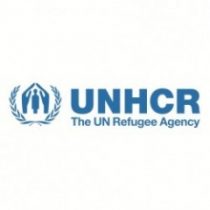What does UNHCR work for?
The Office of the United Nations High Commissioner for Refugees was established on December 14, 1950 by the United Nations General Assembly. The agency is mandated to lead and co-ordinate international action to protect refugees and resolve refugee problems worldwide. Its primary purpose is to safeguard the rights and well-being of refugees. It strives to ensure that everyone can exercise the right to seek asylum and find safe refuge in another State, with the option to return home voluntarily, integrate locally or to resettle in a third country.
By mid-2013, the total population of concern to UNHCR stood at 38.7million: 11.1million refugees, 987,500 asylum-seekers, 189,300 repatriated refugees, 20.8 million IDPs protected/assisted by UNHCR, 688,200 IDPs who returned to their place of origin, 3.5 million stateless persons, and1.4 million others of concern.
UNHCR celebrated its 60th anniversary on 14 December 2010, aware that the humanitarian needs are unlikely to disappear. In 1954, the organization won the Nobel Peace Prize for its work achievements. More than a quarter century later, in 1981, UNHCR received the Nobel Peace Prize again, for its worldwide assistance to refugees.
What are the main achievements of UNHCR in the past 60 years?
UNHCR’s ultimate goal is to help find durable solutions that will allow them to rebuild their lives in dignity and peace. There are three solutions open to refugees where UNHCR can help: voluntary repatriation; local integration; or resettlement to a third country in situations where it is impossible for a person to go back home or remain in the host country.
Over the past 60 years, UNHCR has helped for tens of millions of refugees to find durable solutions.
Who are the people who work for UNHCR?
From only 34 staff members when UNHCR was founded, it now has more than 7,138 regular staff members, including 863 in UNHCR’s Geneva headquarters. The agency is present in 123 countries, with staff based in 449 locations.
UNHCR staff come from all different countries with various backgrounds including but not limited to lawyers, engineers, anthropologists, teachers, social scientists, economists and IT people. What they all have in common is the desire to protect refugees by safeguarding refugee’s rights and contribute to the well-being of uprooted people.
What are the UNHCR activities in Estonia?
In Estonia, UNHCR provides guidance on refugee and asylum law and policy to the Estonia’s government, legal practitioners, non-governmental organisations and others. If necessary, UNHCR intervenes in court proceedings, which are precedent-setting for the international protection of refugees. UNHCR also provides training on a range of issues to those working with asylum-seekers and refugees in Estonia. In 2011 UNHCR supported the establishment of the free legal aid system for asylum-seekers in Estonia and since that time cooperates actively with the Estonian Human Rights Centre and the legal clinic at the Law School of Tallinn University of Technology. As a partner, in 2012-2013 UNHCR has contributed to the implementation of the project on raising awareness about refugees among general public in Estonia.
Also, together with the IOM, UNHCR launched the project PARE (Public Awareness Risking on the Notion of Migration and Asylum in Estonia: Refugees? Who? Why?), with the aim to enhance the awareness of students, teachers, and the general public of the situation of asylum-seekers, refugees and migration. The World Refugee Day, the 20th June, is every year marked in UNHCR member states, including Estonia. Photo exhibitions, competitions and film screenings are activities that previously have taken place.
How can ordinary people help UNHCR?
There are many ways in which you can help UNHCR – whether it’s making a donation, raising awareness or working for the organization; it all counts towards helping refugees rebuild their lives:
One way is to make a donation via http://donate.unhcr.org/, which will go to where the need is greatest, helping our operations around the world. It is an easy process and you can give whatever amount you want – it all helps.
Aiste Andreja Lukosiunaite
UNHCR Regional Representation for Northern Europe
Since you are here...
It is important to protect everyone’s human rights, because it helps to keep stability and peace in the society. There are many challenges for protection of human rights in Estonia: intolerance has really come out of the closet. Bad things happen when good people are too passive, but together we can make a change.
Estonian Human Rights Centre is the competent, accountable and impactful independent human rights organisation in Estonia. Your recurring or one-time donation helps to stand up for human rights everywhere: in courts, in the media, in schools, in the workplace, on the streets and in governmental venues.
Donating is easy, and you can use your credit card if donating from abroad.
Donate now